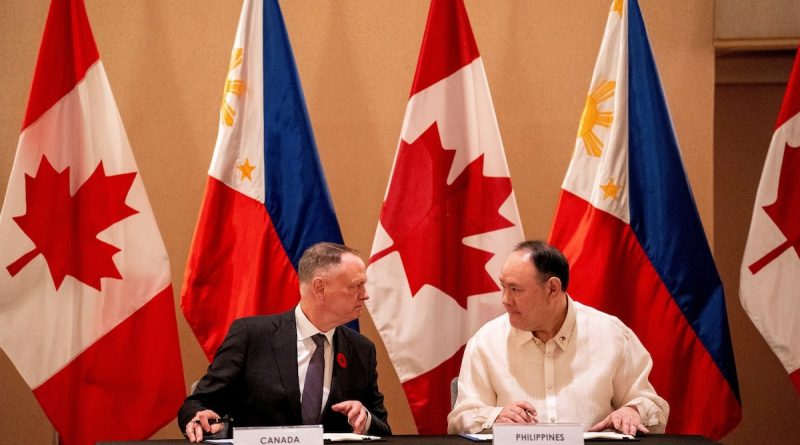Philippines, Canada sign defense pact to strengthen Indo-Pacific security cooperation
Manila – The Philippines and Canada have taken a major step forward in enhancing their defense and security partnership with the signing of the Status of Visiting Forces Agreement (SOVFA) in Makati City, Metro Manila.
The landmark pact, signed on Sunday by Philippine Defense Secretary Gilberto Teodoro Jr. and Canadian Defence Minister David McGuinty, marks Canada’s first such defense agreement in the Indo-Pacific region.
The accord underscores both nations’ shared commitment to promoting peace, stability, and a rules-based international order in the region.
The new SOVFA establishes a framework that allows for mutual training and deployment of military personnel between the two countries.
It enables both armed forces to train on each other’s soil, deepening defense cooperation, enhancing interoperability, and fostering stronger coordination in addressing regional and global security challenges.
The agreement also reflects a broader strategic vision aimed at preserving peace, promoting maritime security, and safeguarding the freedom of navigation in the Indo-Pacific.
During the signing ceremony, Defense Secretary Teodoro highlighted the significance of the agreement, describing it as a “testament to the enduring friendship and shared values between the Philippines and Canada.”
He emphasized that the SOVFA reaffirms both nations’ dedication to upholding international law, particularly the United Nations Convention on the Law of the Sea, and protecting the sovereignty of nations against unlawful maritime claims.
“At its core, this agreement stands on the foundation of preserving the rules-based international order,” Teodoro stated.
Minister McGuinty praised the Philippines for its leadership in maintaining regional peace and stability and reaffirmed Canada’s long-standing support for Manila’s position in the South China Sea.
He noted that Canada’s growing engagement in the Indo-Pacific reflects its commitment to being a proactive and reliable partner in ensuring a secure and prosperous region.
“This agreement opens the door for deeper collaboration between our armed forces and signals our shared dedication to freedom, democracy, and mutual security,” he said.
The Philippines has actively expanded its network of security partnerships in recent years amid rising geopolitical tensions. With the addition of the Canada pact, the Philippines now maintains troop agreements with five nations, including the United States, Australia, Japan, and South Korea.
These partnerships enable the Philippines to engage in joint training, intelligence sharing, and coordinated responses to common threats, particularly in maritime security and humanitarian assistance.
In recent years, the Philippines and Canada have also advanced cooperation in maritime domain awareness. In 2023, both nations agreed to utilize Ottawa’s Dark Vessel Detection System, a cutting-edge technology that identifies ships involved in illegal, unreported, and unregulated fishing.
The system uses satellite data to detect vessels that disable tracking transmitters to evade authorities, helping protect marine resources and strengthen maritime law enforcement.
The SOVFA builds on this foundation of collaboration, allowing both sides to work more closely in military training, humanitarian response, and peacekeeping initiatives.
It complements existing alliances such as the Philippines’ long-standing Mutual Defense Treaty with the United States and recent agreements with Japan and Australia, reflecting a more robust and diversified security architecture in the region.
The new pact comes as regional security dynamics grow more complex, particularly in the South China Sea. The Philippines, supported by allies such as Canada, continues to advocate for peaceful resolutions based on international law, including the 2016 ruling by the Permanent Court of Arbitration that invalidated China’s expansive maritime claims.
Both governments expressed optimism that the SOVFA will pave the way for greater cooperation in disaster response, counterterrorism, cybersecurity, and maritime defense.
The agreement symbolizes not only a strengthening of military ties but also a deepening friendship rooted in shared democratic values, mutual respect, and a common vision for a peaceful Indo-Pacific.
As the Philippines and Canada move forward, the SOVFA stands as a beacon of unity and strategic partnership — reaffirming their role as responsible allies committed to maintaining peace, stability, and prosperity across the Indo-Pacific region.



